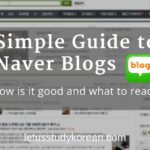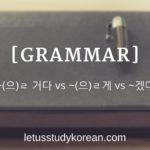~는/은/ㄴ 모양이다 (~neun/~eun/~ni-eun mo-yang-i-da) – seems like/looks like
This is quite similar with ~(은/ㄴ & 을/ㄹ)것 같다 and ~을/ㄹ걸.
The main difference is you would use ~는/은/ㄴ 모양이다 when you’re making an assumption after observing certain things.
You can use this on yourself either – refer to ~(은/ㄴ & 을/ㄹ)것 같다 if you want to use a guess/assumption on something relating to yourself.
~는 모양이다 IS ATTACHED TO VERBS,
Example: 그 남자가 정장을 입고 여행가방을 가져가서 출장으로 가는 모양이다.
That man is wearing a suit and bringing along a luggage so he looks like he’s going on an overseas business trip.
~은/ㄴ 모양이다 IS ATTACHED TO VERBS (PAST TENSE),
Example: 어제 그 구두쇠 아줌마가 특별히 닭갈비를 줘서 북권에 당첨된 모양이다.
Yesterday, that miser ahjumma specially gave us spicy stir-fried chicken so it looks like she struck the lottery.
~을/ㄹ 모양이다 IS ATTACHED TO VERBS (FUTURE TENSE),
Example: 음울한 하늘을 보니 곧 비가 많이 올 모야이다.
Looking at the gloomy sky, it looks like it is going to rain very heavily soon.
~은/ㄴ 모양이다 IS ATTACHED TO ADJECTIVES,
Example: 아빠는 너무 급하게 집에 나가서 오늘 바쁜 모양이다.
Dad went out of the house so hurriedly so it looks like he’s busy today.
~았/었/였/했던 모양이다 IS ATTACHED TO ADJECTIVES (PAST TENSE)
Example: 이 사진 속에 삼촌은 너무 체격이 좋아서 예전에 강했던 모양이다.
In this picture, uncle looked really well-built so he looks like he was strong last time.
~을/ㄹ 모양이다 IS ATTACHED TO ADJECTIVES (FUTURE TENSE),
Example: 그 어린은 엄마와 아빠를 너무 잘 지켜서 미래에 성격이 좋을 모양이다.
That kid takes such good care of his Mom and Dad so it looks like his personality will be good in the future.
~인 모양이다 IS ATTACHED TO NOUNS,
Example: 누나는 우리를 잘 가르쳐서 선생님인 모양이다.
Noona teaches us very well so she looks like a teacher.
~이였던/였던 모야이다 IS ATTACHED TO NOUNS (PAST TENSE).
Example: 지금도 그 아저시 예전에 가르친 학생들이 그의 집으로 가서 아저시는 진짜 유명한 교수님이였던 모양이다.
Even now, students who were taught by that uncle still went to his house so it looks like he was a really famous professor back then.




